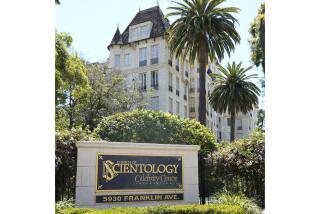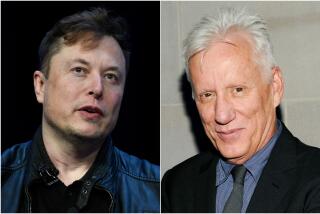Wikipedia bans Scientology writers
- Share via
The Internet encyclopedia Wikipedia has blocked all contributions from computers at the Church of Scientology’s Los Angeles headquarters to stop users there from revising articles to reflect a pro-Scientology viewpoint.
The site has also banned some critics of the controversial religion from editing Scientology articles to tamp down a long-standing battle between the two groups, a Wikipedia spokesman said.
The decision made last week has generated an outcry among some bloggers who worry that Wikipedia, the eighth-most-popular site on the Web, is stifling free speech.
But the process is routine. Wikipedia may pride itself as a beacon of online egalitarianism, but it bans hundreds of users each day.
Dan Rosenthal, a spokesman for English Wikipedia, said about 300 users were blocked or banned from the site daily for vandalism or breaking rules designed to keep people with an agenda from propagandizing.
The Scientology decision was made after hundreds of articles relating to the religion became virtual battlegrounds. Rosenthal said the Church of Scientology -- using multiple accounts -- was locked in a fierce edit war with critics.
Six months ago, the Scientology case was brought before Wikipedia’s arbitration committee, a body of volunteer editors elected by users to resolve disputes. It decided that both camps deserved punishment.
Several Internet addresses corresponding to computers at the Church of Scientology were banned, along with 40 registered users from both sides of the debate. All but one of the banned users have successfully petitioned Wikipedia to have their editing privileges reinstated, Rosenthal said. The Church of Scientology has not.
Karin Pouw, a spokeswoman for the church, said she was not aware of any Wikipedia editing by church members, but she did not complain about the decision.
“This is a routine internal action by Wikipedia to clean up its editing process,” Pouw said.
She added that she was glad the site had banned Scientology critics, who were engaged in “biased editing for the purposes of antagonism as opposed to providing accurate information.”
In a post on Foreign Policy’s website, technology blogger Evgeny Morozov wondered whether “Wikipedia’s decision opens Pandora’s box.”
“Why allow Christians to edit articles on Christianity?” he asked.
Rosenthal defended Wikipedia’s practice, saying the site “is not in the business of blocking specific organizations.”
“But if there is a history of violators linked to an . . . address, we’ll go ahead and block them,” he said. “If you don’t want to play by the rules, go home.”
In 2006, Wikipedia temporarily blocked certain Capitol Hill Web addresses when it was revealed that congressional aides had been deleting references to unmet campaign promises. This year, bloggers alleged that the site blocked computers at the Justice Department for removing references to certain terrorist groups.
Rosenthal said he did not know whether there was truth to those claims.
The Scientology dispute has raised questions about the role of free speech on the Internet.
Tim Wu, a professor of Internet law at Columbia Law School and the chairman of Free Press, a media reform group, said that more and more, decisions about free speech were being made online. Websites such as Google, Facebook and Wikipedia now act as gatekeepers of information.
“Wikipedia has more power over speech than many governments,” he said. “We have to make sure that they’re being reasonable.”
--







